South Georgia and the South Sandwich Islands
stamps
P=have O=don’t have it

South
Georgia and the South Sandwich Islands (SGSSI) is a British
overseas territory in the southern Atlantic Ocean.
It is a remote and inhospitable collection of islands, consisting of South
Georgia and a chain of smaller islands, the South Sandwich
Islands. South Georgia is
167.4 kilometers (104.0 mi) long and 1.4 to 37 km (0.87 to 23 miles) wide and is by
far the largest island in the territory. The South Sandwich Islands lie about 520 kilometers
(320 mi)
to the south-east of South Georgia. The total
land area of the territory is 3,903 square kilometers
(1,507 sq mi).
There
is no native population on any of the islands, and the only present inhabitants
are the British Government Officer, Deputy Postmaster, scientists, and support
staff from the British Antarctic Survey who maintain scientific bases at Bird
Island and at the capital, King Edward Point, as well as museum staff at nearby
Grytviken.
The
United Kingdom claimed
sovereignty over South Georgia in 1775 and the South
Sandwich Islands in 1908. In 1908 the United
Kingdom annexed both South Georgia and the South Sandwich Islands. The territory of "South
Georgia and the South Sandwich Islands"
was formed in 1985; previously it had been governed as part of the Falkland Islands Dependencies. Argentina claimed South
Georgia in 1927, and the South Sandwich Islands
in 1938.
Argentina
maintained a naval station, Corbeta Uruguay
on Thule Island
in the South Sandwich Islands from 1976 until
1982 when it was closed by the Royal Navy. The Argentine claim over South
Georgia contributed to the 1982 Falklands War, during which Argentine forces
briefly occupied the Island. Argentina continues to claim sovereignty of
South Georgia and the South Sandwich Islands. http://en.wikipedia.org/wiki/South_Georgia_and_the_South_Sandwich_Islands
See: Falkland Islands stamps
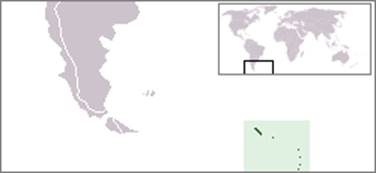
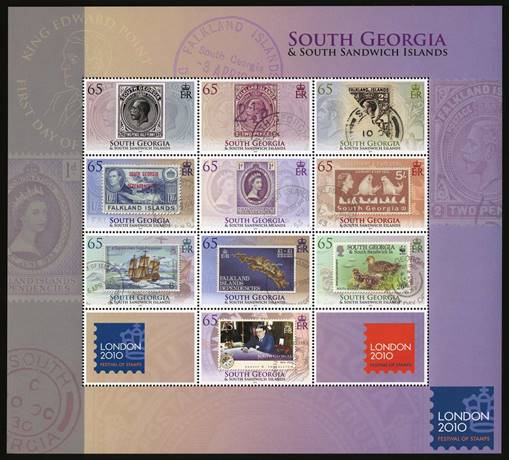
Scott: #403P
Issued: 12.04.2010
100th Anniversary, the Post Office of South Georgia and the
South Sandwich Islands
Thanks to Prof. Plinio
Richelmi
The
Post Office on South Georgia opened in 22
December 1909; some two years after the first whaling station had been
established at Grytviken. Up to 1944 stamps from the Falkland Islands were
used, but stamped with a South Georgia stamp.
Each
of the stamps in the sheet represents one decade in its history.
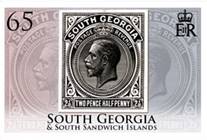
1909-1918:
The Post Office used Falkland Islands stamps
until 1944. However, in 1911 James Innes Wilson, the Postmaster, had proposed
that the island issue its own postage stamps. This was supported by the
authorities on the Falkland Islands and an
‘essay’ (a stamp that was designed but never issued) was produced for the 2½d
foreign rate. The order for the stamps was cancelled on 19th December 1911
following instructions issued by the Secretary of State for the Colonies. Two
sepia essays were produced by De La Rue depicting an engraved head of King
George V based on a portrait by the Australian sculptor Bertram Mackennal.
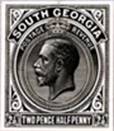 Inside 403a: South Georgia and the South Sandwich
Islands essay of 1911O
Inside 403a: South Georgia and the South Sandwich
Islands essay of 1911O
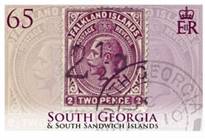
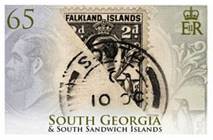
1919
to 1928 and 1929 to 1938: There were a number of occasions when the Post Office
ran out of stamps, in particular the 1d and 2½d values needed for the basic
Inland, Commonwealth and Foreign rates. This led to several different
provisional solutions. 2d stamps were overprinted locally in January 1928 with
a metal hand stamp reading 2½d and 2d stamps of the Whales and Penguins issue
were bisected in October 1930 to act as 1d stamps. (Bisects had also been used
in March 1923. Special hand stamps reading “Paid at/At South
Georgia” were used from October 1911 to February 1912 on postcards
and envelopes without stamps.)
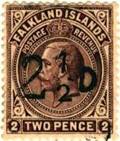 Inside 403b: Falkland Islands #52O (Falkland Islands #43 overprinted 2½d)
Inside 403b: Falkland Islands #52O (Falkland Islands #43 overprinted 2½d)
![[King George V, type XXF2]](South%20Georgia_image019.jpg) Inside 403c: Falkland
Islands #56O
Inside 403c: Falkland
Islands #56O
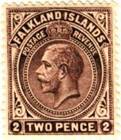 Inside 403 (In margin): Falkland
Islands #43O
Inside 403 (In margin): Falkland
Islands #43O
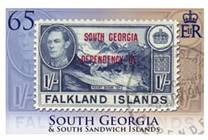
1939-1948:
At this time South Georgia and the South Sandwich Islands
were one of the Falkland Islands Dependencies. In December 1943 the United Kingdom Government sent a secret military
force south under the codename “Operation Tabarin” to establish bases on other
FI Dependencies: the South Orkney Islands, the South Shetland Islands and Graham Land. All the Dependencies were issued with their
own postage stamps by overprinting the current ½d to 1/- King George VI values
of the Falkland Islands. The 1/- value issued
for South Georgia depicting Mount
Sugartop represents this
period. The stamps were officially issued to the public in London
and at King Edward
Point, South
Georgia, on 3rd April 1944.
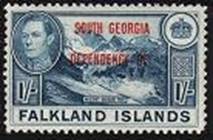 Inside 403d: Falkland
Islands #3L8O
Inside 403d: Falkland
Islands #3L8O
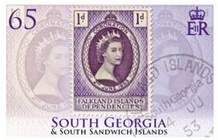
1949-1958:
From February 1946 to July 1963 South Georgia
used stamps inscribed “Falkland Islands Dependencies”. This period is
represented by the 1d stamp issued on 4th June 1953 for the Coronation of Queen
Elizabeth II.
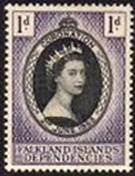 Inside 403e and in margin: Falkland
Islands #1L18O
Inside 403e and in margin: Falkland
Islands #1L18O
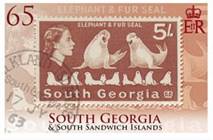
1959-1968:
Following the ratification of the Antarctic Treaty by the United Kingdom in 1960, the political decision
was taken to form the South Orkneys, the South Shetlands and Graham Land into a
separate UK Overseas Territory – The British Antarctic Territory - while South
Georgia and the South Sandwich Islands remained dependencies of the Falkland Islands. South Georgia
issued a new definitive series on 17th July 1963. The 5/- value depicting
elephant and fur seals represents the definitive series which was overprinted
with decimal values in 1971 and remained the definitive issue until 1980.
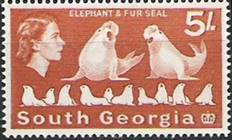 Inside 403f: South
Georgia #13O
Inside 403f: South
Georgia #13O
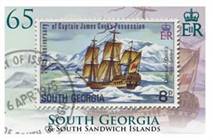
1969-1978:
South Georgia celebrated on 17 January 1975
the bicentenary of Captain Cook taking possession of the island in the name of
King George III. Commemorative stamps were issued on 26th April 1975. The
8p value depicts Cook’s ship Resolution in ice floes with the mountains of South Georgia in the background.
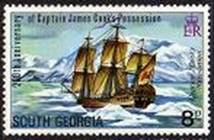 Inside 403g: South
Georgia #42O
Inside 403g: South
Georgia #42O
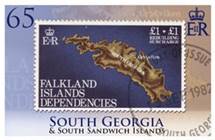
1979
- 1988: Grytviken, King Edward Point
and Leith Harbour were occupied by Argentine
Military Forces from 3rd to 25th April 1982. Following liberation, the Falkland
Islands Dependencies issued on 13th September 1982 a £1 stamp with a £1
charity surcharge in favour of the South Atlantic Fund. The stamp depicts a map
of South Georgia. South Georgia and the South Sandwich Islands became a distinct UK Overseas
Territory on 3rd October 1985.
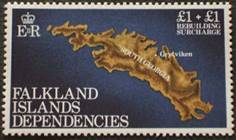 Inside 403h:
Falkland Islands #1LB1O
Inside 403h:
Falkland Islands #1LB1O
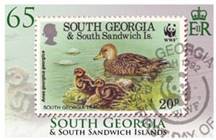
1989-1998:
Times have changed on South Georgia. The last
land-based whaling station closed in 1965. The island is a wildlife paradise
and strict conservation measures are now in force. The wildlife has been
depicted on many stamps over the years. On 12th March 1992 a set of stamps was
released relating to Teal ducks which breed on South
Georgia. The 20p value shows an adult and two ducklings. The
stamps also bear the Panda Logo © of the World Wildlife Fund WWF ®, now
referred to in many countries except the USA and Canada as the World Wide Fund
for Nature.
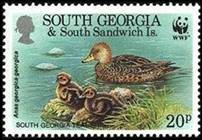 Inside 403i: South
Georgia #165O
Inside 403i: South
Georgia #165O
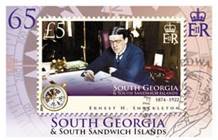
1999
to date: The name “Sir Ernest Shackleton” will forever be associated with the island of South Georgia. His heroic boat journey
in the James Caird from Elephant Island to the west coast of South
Georgia in 1916 and his subsequent crossing of the island are
legendary. Sir Ernest died on board the Quest in King Edward Cove on 5th
January 1922 and is buried in the local cemetery. In August 2009, South Georgia
and the South Sandwich Islands issued a new
definitive series commemorating his life; the £5 value is depicted here.
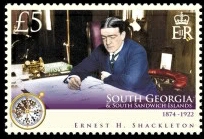 Inside 403j: South Georgia #391O
Inside 403j: South Georgia #391O
http://falklandstamps.com/index.php?option=com_content&view=article&id=125:ten-decades-of-stamps&catid=43:commemoratives-&Itemid=124

http://www.sgisland.gs/index.php/(g)stamps
HOME | COUNTRIES LIST

Wish List
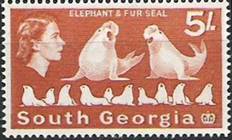
South Georgia #13
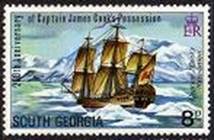
South Georgia #42
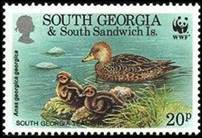
South Georgia #165 + for Saint Thomas & Prince
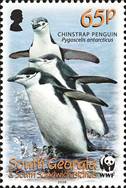
South Georgia #369 for Guinee

South Georgia #391
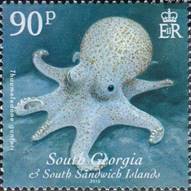
South Georgia & South Sandwich Islands #400 for
Mozambique
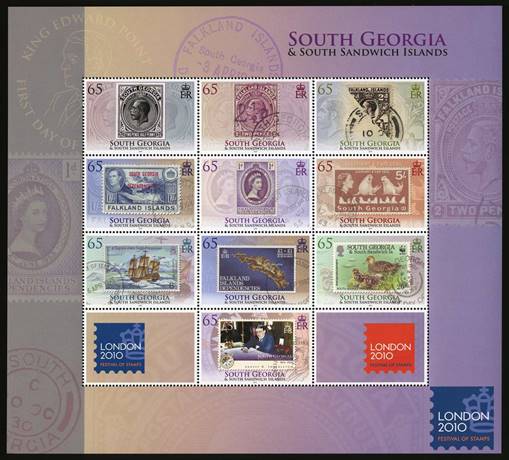
Scott: #403O(OTW-4193)


 Inside 403a: South Georgia and the South Sandwich
Islands essay of 1911O
Inside 403a: South Georgia and the South Sandwich
Islands essay of 1911O

 Inside 403b: Falkland Islands #52O (
Inside 403b: Falkland Islands #52O (![[King George V, type XXF2]](South%20Georgia_image019.jpg) Inside 403c:
Inside 403c:  Inside 403 (In margin):
Inside 403 (In margin): 
 Inside 403d:
Inside 403d: 
 Inside 403e and in margin:
Inside 403e and in margin: 
 Inside 403f: South
Georgia #13O
Inside 403f: South
Georgia #13O
 Inside 403g: South
Georgia #42O
Inside 403g: South
Georgia #42O
 Inside 403h:
Falkland Islands #1LB1O
Inside 403h:
Falkland Islands #1LB1O
 Inside 403i: South
Georgia #165O
Inside 403i: South
Georgia #165O
 Inside 403j: South Georgia #391O
Inside 403j: South Georgia #391O![]()
![]()








